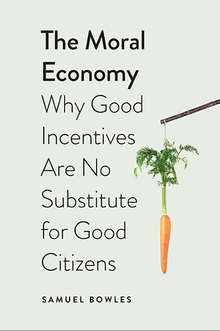WHY GOOD INCENTIVES ARE NO SUBSTITUTE FOR GOOD CITIZENS
For those interested in pay for performance, the book by Samuel Bowles will open their minds to new perspectives. The rationale behind the Homo economicus needs to be adjusted to ethical and altruistic motives, professionalism in other words. This explanation of the prisoner's dilemma is helpful.
In the Prisoner’s Dilemma game, defecting rather than cooperating with one’s partner maximizes a player’s payoff, irrespective of what the other player does. Defecting in this game is what game theorists call a dominant strategy, and the game is extremely simple; it does not take a game theorist to figure this out. So, assuming that people care only about their own payoffs, we would predict that defection would be universal.
But when the game is played with real people, something like half of players typically cooperate rather than defect. Most subjects say that they prefer the mutual cooperation outcome over the higher material payoff they would get by defecting on a cooperator, and they are willing to take a chance that the other player feels the same way (and is willing to take the same chance.
When players defect, it is often not because they are tempted by the higher payoff that they would get, but because they know that the other player might defect, and they hate the idea that their own cooperation would be exploited by the other. We know this from what happens when the Prisoner’s Dilemma is not played simultaneously, as is standard, meaning that each person decides what to do not knowing what the other will do, but instead is played sequentially (one person chosen randomly moves first). In the sequential game, the second mover usually reciprocates the first player’s move, cooperating if the first has done so, and defecting otherwise. Keep in mind the fact that avoiding being a chump appears to be the motive here, not the prospect of a higher payoff.
Stanton at Galeria Barnadas
